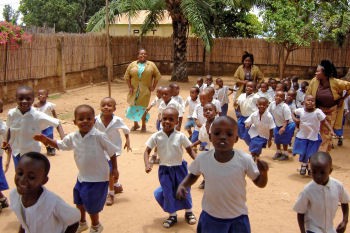Child Sponsorship background from Uvira, Democratic Republic of Congo
 SOS Children's Village Uvira
SOS Children's Village Uvira
SOS Children's Village Uvira is located on the outskirts of the city and consists of 15 family houses with a capacity of up to 150 children. It has a village director's house, an administration building and a house for the SOS aunts (SOS Children's Village mothers in training or family helpers who support the SOS mothers).
Other SOS Projects in Uvira
The SOS Children's Village also has a nursery and a primary school. Both were opened in October 2000 and were renovated in 2006. The nursery consists of three classrooms with a capacity of 75 children. In addition, there is a multi-purpose room, an administration room, the director's office and an archive. Up to 210 children can be taught at the SOS Primary School, which has six classrooms, a library, a meeting-room for the teachers and several offices. Both schools are attended by children from the SOS Children's Village and children from the neighbouring communities.
In September 2006, an SOS Medical Centre was opened with the aim to provide medical care and inform people about local preventive measures. The centre has two examination rooms, one treatment room, a reception and administration area, two laboratories and a pharmacy. Up to 1,400 patients can be treated there every month.
The SOS Youth Home is designed to encourage young people to become independent and to make it easier for them to integrate into society and the working world. It was opened in September 1999 (for the boys) and August 2004 (for the girls) and makes it possible for the young people to prepare for independent life under the guidance of educators. Four houses of eight rooms each have been rented and can accommodate up to 62 young people
Background to Uvira
The town of Uvira is located in South Kivu province, 124 km south of the province capital, Bukavu. It is situated on the northernmost point of Lake Tanganyika, opposite Bujumbura, the capital city of Burundi. Due to its strategic position on the lake, which connects Uvira to Bujumbura in Burundi, to Kigoma in Tanzania and to Mpulungu in Zambia, the town has been the source of many conflicts throughout the history of this part of the Democratic Republic of Congo.

 Return to Schools Wikipedia Home page…
Return to Schools Wikipedia Home page…
